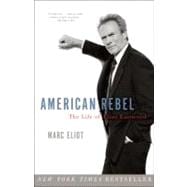
What is included with this book?
MARC ELIOT is the New York Times bestselling author of more than a dozen books on popular culture, among them the highly acclaimed biographies Cary Grant and Jimmy Stewart; the award-winning Walt Disney: Hollywood’s Dark Prince; Down 42nd Street; what many consider the best book about the sixties, his Phil Ochs biography, Death of a Rebel; Take It from Me (with Erin Brockovich), Down Thunder Road: The Making of Bruce Springsteen; To the Limit: The Untold Story of the Eagles; and Reagan: The Hollywood Years. He has written on the media and pop culture for numerous publications, including Penthouse, L.A. Weekly, and California Magazine. He divides his time among New York City, Woodstock, Los Angeles, and the Far East.
The New copy of this book will include any supplemental materials advertised. Please check the title of the book to determine if it should include any access cards, study guides, lab manuals, CDs, etc.
The Used, Rental and eBook copies of this book are not guaranteed to include any supplemental materials. Typically, only the book itself is included. This is true even if the title states it includes any access cards, study guides, lab manuals, CDs, etc.